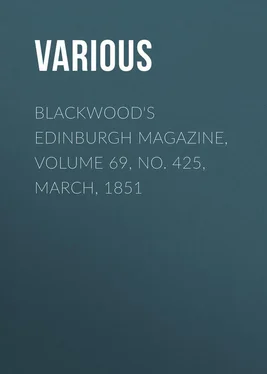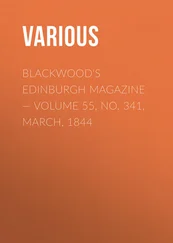Our poor friend Lenny drew plenty of this stuff from the Tinker's bag. He thought it very clever and very eloquent; and he supposed the statistics were as true as mathematical demonstrations.
A famous knowledge-diffuser is looking over my shoulder, and tells me, "Increase education, and cheapen good books, and all this rubbish will disappear!" Sir, I don't believe a word of it. If you printed Ricardo and Adam Smith at a farthing a volume, I still believe that they would be as little read by the operatives as they are now-a-days by a very large proportion of highly cultivated men. I still believe that, while, the press works, attacks on the rich, and propositions for heave-a-hoys, will always form a popular portion of the Literature of Labour. There's Lenny Fairfield reading a treatise on hydraulics, and constructing a model for a fountain into the bargain; but that does not prevent his acquiescence in any proposition for getting rid of a National Debt, which he certainly never agreed to pay, and which he is told makes sugar and tea so shamefully dear. No. I tell you what does a little counteract those eloquent incentives to break his own head against the strong walls of the Social System – it is, that he has two eyes in that head, which are not always employed in reading. And, having been told in print that masters are tyrants, parsons hypocrites or drones in the hive, and landowners vampires and bloodsuckers, he looks out into the little world around him, and, first, he is compelled to acknowledge that his master is not a tyrant, (perhaps because he is a foreigner and a philosopher, and, for what I and Lenny know, a republican.) But then Parson Dale, though High Church to the marrow, is neither hypocrite nor drone. He has a very good living, it is true – much better than he ought to have, according to the "political" opinions of those tracts; but Lenny is obliged to confess that, if Parson Dale were a penny the poorer, he would do a pennyworth's less good; and, comparing one parish with another, such as Roodhall and Hazeldean, he is dimly aware that there is no greater CIVILISER than a parson tolerably well off. Then, too, Squire Hazeldean, though as arrant a Tory as ever stood upon shoe-leather, is certainly not a vampire nor bloodsucker. He does not feed on the public; a great many of the public feed upon him: and, therefore, his practical experience a little staggers and perplexes Lenny Fairfield as to the gospel accuracy of his theoretical dogmas. Masters, parsons, and landowners! having, at the risk of all popularity, just given a coup de patte
Конец ознакомительного фрагмента.
Текст предоставлен ООО «ЛитРес».
Прочитайте эту книгу целиком, купив полную легальную версию на ЛитРес.
Безопасно оплатить книгу можно банковской картой Visa, MasterCard, Maestro, со счета мобильного телефона, с платежного терминала, в салоне МТС или Связной, через PayPal, WebMoney, Яндекс.Деньги, QIWI Кошелек, бонусными картами или другим удобным Вам способом.
Edinburgh Review , January 1851, p. 23.
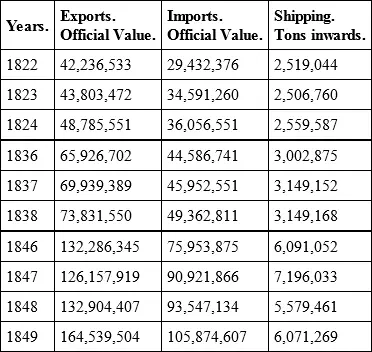
– Parliamentary Tables.
Times , Jan. 21, 1851.
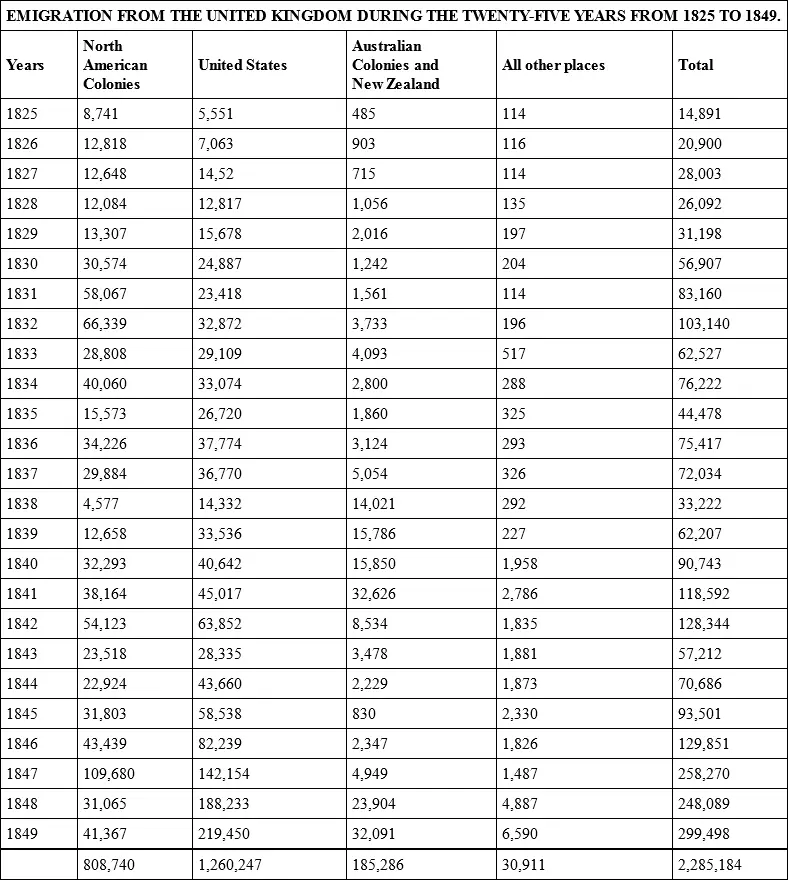
Average annual emigration from the United Kingdom for the last twenty-five years, 91,407.
Table showing the commitments for Serious Crime in England, Scotland, and Ireland, from 1822 to 1849, both inclusive: —
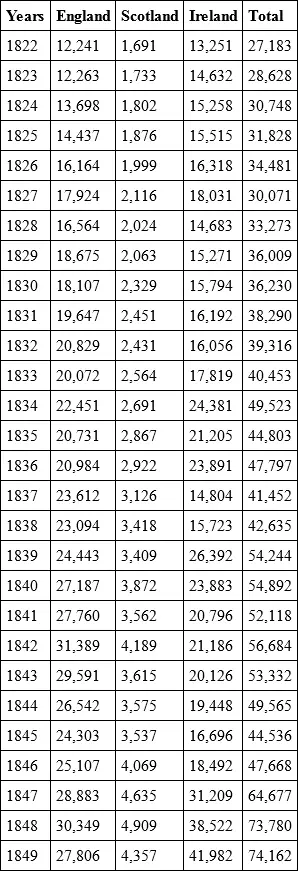
Table showing the Poor's Rates of England and Wales, with their Population, and the amount in Quarters of Grain in every year, from 1822 to 1849, both inclusive: —
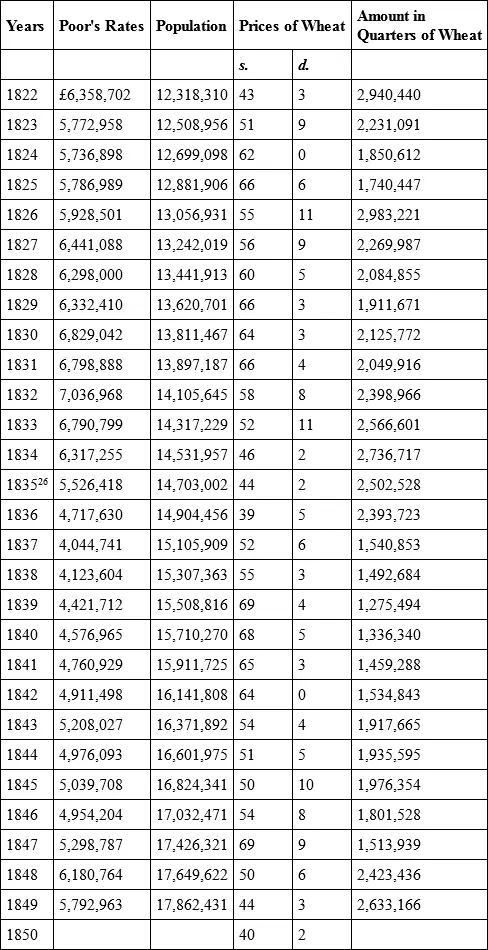
26 New Poor-Law came into operation.
Poor's-Rate Report , 1849; and Porter, 90, 3d ed. – The five last years' prices are not from Mr Porter's work, where they are obviously wrong, but from Parl. Pap. 1850, No. 460.
Dr Young's Report , Jan. 1851
Edinburgh Review , Jan. 1851.
Dr Strang's Report , 1851.
Modern System of Low-priced Goods , p. 2, 3.
Alton Locke , vol. i. p. 149-50.
It was ascertained, from an accurate return obtained by the Magistrates of Glasgow, that the number of persons who arrived at that city by the Clyde, or the Ayrshire railway, in four months preceding 10th April 1848, was 42,860.
Parliamentary Return, 1851.
The following Returns from three seaports alone – London, Liverpool, and Dublin – in 1849 and 1850, will show how rapidly this ruinous process is going on: —
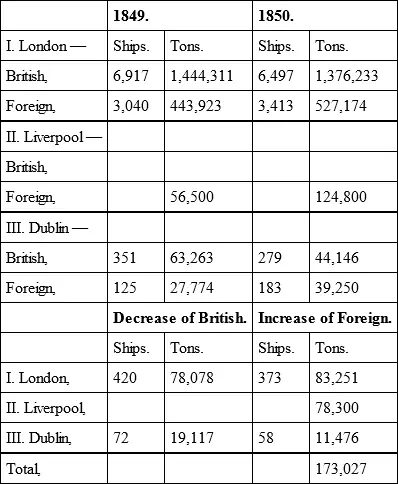
Including the police committals, much more numerous than those for trial.
"At present the native consumption of cotton in India is estimated at from 1,000,000,000 lb. to 3,000,000,000 lb. annually; while the export to Great Britain is only 60,000,000 lb., and to all the world only 150,000,000 lb. In this state of things, the rough production that suits the home market will, of course, only be carried on; while, if sufficient means of conveyance existed to render the cotton that is now grown in the interior, at 1¼d. per lb., remunerative for export, increased care in its preparation would be manifested, as was the case in the United States, just in proportion to the increased reward that would result. In developing these views, Mr Chapman undertakes to demonstrate, by well-arranged facts and tables, that the export of cotton from India to England has risen exactly as the difficulties or expense of its transmission have been diminished; and also that costs and impediments still remain which are sufficient to account for the smallness of the quantity we continue to receive." — Times , Jan. 1851.
It need scarcely be observed, that Jackeymo, in his conversations with his master or Violante, or his conferences with himself, employs his native language, which is therefore translated without the blunders that he is driven to commit when compelled to trust himself to the tongue of the country in which he is a sojourner.
